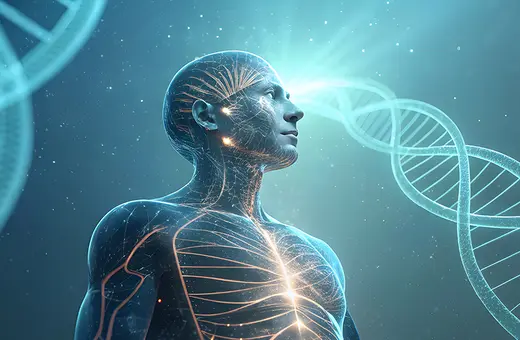Future technologies could change what it means to be human. A life lived without the prospect of death is an unimaginably different life. The changes will be vast, and they will not only affect individuals; they will change geopolitics. Nayef Al-Rodhan argues we must prepare for the transhumanist age of longevity and the possible elimination of death to prevent a new era of inequality from coming into being.
Can we truly outpace our genetic inheritance? Is it possible to rewrite the biological script that governs ageing or genetic capacity? How will the possibility of radical longevity reshape our societies and the frameworks of global governance? And how might the pursuit of a longer life and transhumanist interventions – enhancing cognition, physiology, or emotional regulation – further blur the boundary of what it means to be human?
The pursuit of longevity and human enhancement is not only a scientific ambition but also an expression of deep-seated human drives. Among our most enduring motivations is the desire for permanency: to survive, to leave a legacy, and to transcend the limits of time. From ancient myths of immortality to today’s laboratories, this impulse has been a constant in human history. What differs now is the means: no longer symbolic or mythical, but grounded in advances in genetics, neuroscience, and artificial intelligence. In this sense, transhumanism and longevity research embody the modern form of humanity’s timeless quest to outlast its biological constraints.
SUGGESTED VIEWING Forging the transhumanist future With Anders Sandberg
Today, the convergence of genomic editing, regenerative medicine, artificial intelligence, and synthetic biology suggests that anti-ageing remedies may soon progress from speculative fiction to scientific reality. In parallel, transhumanist visions of neurobiological enhancements or even merging humans with machines, enhancing cognition, or genetically modifying our species have introduced new ethical and political dilemmas.
A new ecosystem of scientists, entrepreneurs, and venture capitalists is already at work. Their ambition is not modest: to double or even triple the human lifespan within the next century. While such visions may sound radical, history reminds us that they are not without precedent. At the dawn of the 20th century, average global life expectancy was scarcely above 30 years. A hundred years later, it has more than doubled, largely thanks to advances in sanitation, vaccines, antibiotics, and modern medicine. What was once improbable has become routine. The difference now is scale and intent: we are not simply adding years of survival, but potentially engineering a qualitative transformation of human existence itself. Longevity science is thus best seen as one pillar of a broader transhumanist trajectory, where human biology is not only sustained but actively reimagined.
___
Yet ageing is not a single, uniform process.
___
This frontier, however, is not simply biological. It is philosophical, ethical, and geopolitical. Science may soon grant us longer, healthier lives, while neurotechnologies and biotechnologies promise to enhance human cognition and physical capacities. The real test, however, is whether our governance, moral reasoning, and global institutions can evolve quickly enough to meet these unprecedented transformations. Without adequate foresight, radical longevity and human enhancement could destabilise societies, deepen inequalities, and unsettle the fragile fabric of human dignity. However, with the right planning they could foster a new era of flourishing, allowing us to rethink our social contracts and extend the horizon of human wellbeing and harmonious co-existence.
The civilisational stakes are therefore profound. We should welcome scientific progress that extends and improves life, and that responsibly explores the boundaries of cognitive and physical transhumanist enhancement. But we must also anticipate and govern both the known and potentially unknown consequences before they overtake us.






















Join the conversation